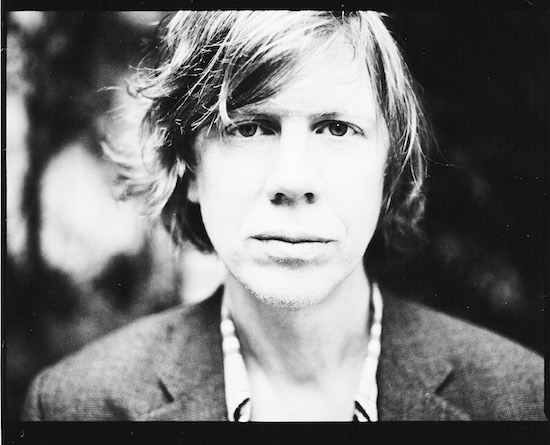In June last year, Thurston Moore released ‘Feel It In Your Guts’, a limited run single that combined extracts from some of Bernie Sanders’ most stirring speeches with a twelve-string acoustic accompaniment courtesy of the former Sonic Youth talisman. A long seven months on – and despite things not exactly going to plan Stateside in the election – Moore is just as, if not more, politically vocal, basing the vast majority of his activity and output around the Zeitgeist.
Having said, "I think musicians have a certain responsibility to use their public celebrity to represent what their stance is politically” the fifty-eight-year-old is already tearing into 2017 with a head full of steam, galvanised by resisting the Trump presidency via art, pro-active defiance and community.
With a forthcoming solo studio album, book and various collaborations and projects in the pipeline for the rocky year ahead, Moore talks to Brian Coney about old conquests, new plans and sticking it to the small-handed man.
Lance Bangs shared a photo of you, Ian McKaye and others at the recent Women’s March in Washington. You’ve been very actively involved in the discussing and protesting Trump for a long time now. What was the feeling on the streets of Washington on the day of the march?
Thurston Moore: Yes, my partner Eva Prinz took that photo of us guys (Ian, Alec, Ian’s son and Lance) at the Women’s March. She brought me to the Women’s March in Washington. When Eva was an Editor at Rizzoli in New York City, she edited [Punk Love] written by Ian MacKaye, Alec MacKaye and Henry Rollins. It was published many years ago, and still one of my favourites about the DC Hardcore Scene with photographs by Susie Horgan. Susie is responsible for those infamous pictures that appeared on the album covers of Teen Idles, Minor Threat and Fugazi. It was great for both of us to catch up with everyone there.
When Eva decided to go Washington it was well before all the other marches were organised. We could’ve stayed home in London! Although it was also important to us to demonstrate the day before the Women’s March in protest to the actual inauguration. Prior to that we were in another Capitol in December when the Electoral College voted, and before that we were in the USA to vote. Many trips this past year to ensure you-know-who didn’t get in, and yet, somehow, curiously the feeling on the streets near the White House and the Capitol on January 20th – the day of the inauguration – was dismal, dark and full of riot police. The next day, on January 21st – the Women’s March – was as though a million angels descended on DC, it was radiant.
On every occasion of meeting on the streets with friends and strangers holding signs, whether we were in the crowd of over a million, or in the freezing cold with forty others, our first reaction has been, YES! We won’t be out here alone. We love being outside with others. And making signs to hold up with the understanding that it is possible these messages could be seen and read all over the world. We also love the musical shout-outs and call-and-responses in the marches.
Needless to say, a lot of people are feeling helpless and worried about what’s happening. In your view, to what extent are the American public helpless now and for the next four years? And what needs to change?
TM: Apathy is understandable and most troublesome. It’s a good time to organise. Talk to each other. Talk to strangers. Meet. Form a shadow cabinet of sorts to look after each other so we’re not having to look to this corporate scum. Deep, practical work.
Can you somehow convince Fugazi to reform and sort the whole mess out?
TM: Good idea.
The recent Chelsea Manning news was quite a surprise. Tell us about ‘Chelsea’s Kiss’. When did you decide to write it and how did you approach it from a lyrical point of view?
TM: The Chelsea Manning song was written by my friend Radieux Radio in London, who actively worked on the Free Chelsea Manning campaign. That campaign was the result of a great deal of deep, practical work by people all over the world.
Touching on your forthcoming album, Rock N’ Roll Consciousness. To what extent has the whole political maelstrom shaped the sound and lyrical themes on the record?
TM: Lyrically, there are a couple songs that have an element of what could be described as music for the Goddesses, you can hear that on tracks ‘Aphrodite’ and ‘Exalted’. A "secret track", one called ‘Ceasefire’, maybe speaks to the political maelstrom, but could also speak to individual attacks. Michelle Obama has that line, "When they go low, we go high." The guitars are heavy Rock N’ Roll and the lyrics are gentle. The songs on Rock N’ Roll Consciousness ponder more universal themes rather than the current political topics. They are songs I want to have and play forever. ‘Cusp’, for example, is about springtime. That moment when you are so close to something you can feel it, but there is still the joy of experiencing it reveal itself, the blossoming.
Ryan Sawyer, Deb Googe and James Sedwards played on ‘Chelsea’s Kiss’. Are they also your band on Rock N’ Roll Consciousness? And what was the recording process like for this record?
TM: We recorded the ‘Chelsea’s Kiss’ single after returning from South America in New York City, where Ryan lives.
The drummer in our band, Thurston Moore Group, is Sonic Youth’s Steve Shelley and he did all of the recording on this new album. We recorded it in London with producer Paul Epworth at his magical studio, The Church, which is located in a lovely, leafy area of London. Paul and I share a birthdate: July 25. When we heard that we knew that we had to work together. The Church was one of the most ideal places to work, and the songs feel ‘touched’ to me somehow.
Featuring contributions from the likes of Lydia Lunch, Richard Hell, Stuart Braithwaite and Michael Gira, Nick Soulsby’s We Sing a New Language: The Oral Discography of Thurston Moore comes out on March 13. Can you shed some light on what to expect there?
TM: Nick Soulsby’s book is a comprehensive discography of my recordings outside Sonic Youth. He interviewed my long-time friends, and new friends and sound engineers, and label people and then met up with me in London for an interview. We’re all thrilled (and impressed) someone has taken on project like this, as I didn’t keep a proper discography, and there are hundreds and hundreds of recordings! Nick dug (almost) all of them out. The title of the book "We Sing a New Language" comes from a song called ‘Vocabularies’ that was on The Thurston Moore Group’s album The Best Day.
You’re as active today as you ever have been. But I’m curious, do you feel the same sense of creative reward beyond the realm of Sonic Youth, considering how much of your life you spent in the band?
TM: It is spiritually fulfilling working with my Group here in London, and traveling together to play concerts. I often wonder if I’m dreaming all this. In secret, as a younger man I would stare at photos of Debbie Googe on the back of those My Bloody Valentine records. I wouldn’t have believed it if someone told me back then that she would one day play bass in my Group. And James Sedwards (AKA "Shredwards") on guitar and Steve Shelley on drums is a blessing so beyond.
Looking forward, what ground do you seek to cover this year and further afield? Will the well even run dry?
TM: I would love to do more writing. Over the last six years, Eva and I have been teaching in the Summer Writing Program at the Jack Kerouac School of Disembodied Poetics at Naropa University in Boulder, Colorado. It was a school started by poets Allen Ginsberg and Anne Waldman with the Buddhist scholar Chogyam Trungpa Rinpoche. It is an enriching environment and has offered us place to be calm, meditate and reflect. We have also been going to Copenhagen for the last couple of years working with young musicians at the Rytmisk Musikkonservatorium, and that too has been fruitful. It’s still fairly new, to be teaching, but we love it.
Finally, 2017 is almost certainly going to be a rough ride. In your view, how should we brace ourselves and act accordingly?
TM: I would say let’s be careful not to follow the leaders. It seems natural that when our boss does something we feel it’s OK for everyone to follow. Let’s be careful not to imitate the behaviour of people like President Trump. Let’s not speak down to anyone or say disparaging things. We’ve been looking into the administrations of Harding and Hoover to prepare for this baddie.
It’s more exciting to remember the powerful work of The Black Panthers in the USA and The Angry Brigade here in the UK. They were creative at delivering their activist messages especially in art and poetry. For example, we love the provocative art work of Emory Douglas and the [understudied] British poet Anna Mendelssohn (AKA Grace Lake). Their work will stay with us in the libraries, bookstores, in our bags, on our person – while we march through these crazy times.
Rock N’ Roll Consciousness is out on April 28



